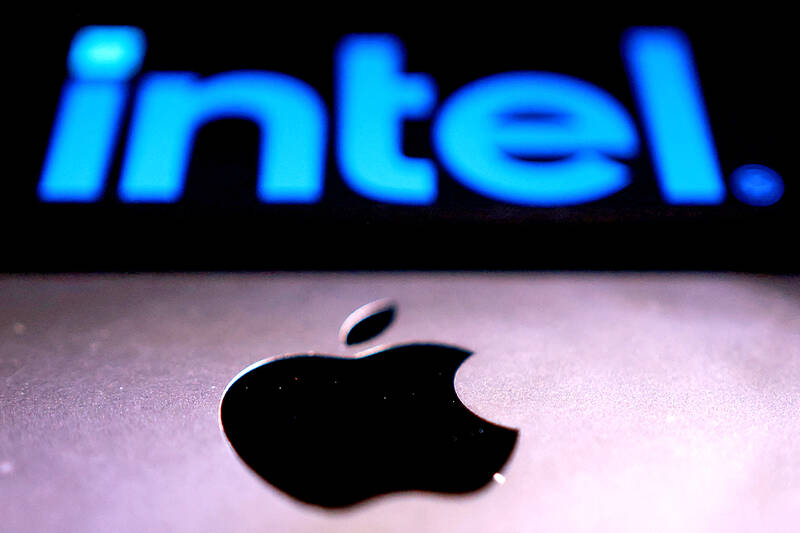Intel Corp has approached Apple Inc about securing an investment in the ailing chipmaker, people familiar with the matter said, part of efforts to bolster a business that is now partially owned by the US government.
Apple and Intel have also discussed how to work more closely together, said the people, who asked not to be identified because the deliberations are private.
The talks are at an early stage and might not lead to an agreement, they said.

Photo: Reuters
Such a deal would follow a US$5 billion investment last week by Nvidia Corp, which plans to work with Intel on chips for personal computers and data centers.
Softbank Group Corp, the Japanese tech giant seeking to expand further in the US, last month announced a US$2 billion investment in Intel.
Intel has also reached out to other companies about possible investments and partnerships, the people said.
A deal with Apple, a long-time Intel customer that switched to in-house processors in the past five years, would represent further validation of the chipmaker’s turnaround bid. Still, it is unlikely that Apple would switch back to Intel processors in its devices.
The iPhone maker’s most sophisticated chips are now produced by partner Taiwan Semiconductor Manufacturing Co (台積電).
A representative for Intel declined to comment.
An Apple spokesperson did not respond to a request for comment.
Intel chief executive officer Lip-Bu Tan (陳立武) is attempting a comeback with the backing of the federal government. In an unconventional deal brokered by US President Donald Trump’s administration last month, the US acquired a roughly 10 percent stake in the chipmaker. Intel is seen as a critical piece of efforts to reinvigorate domestic production — a priority for the White House.
Even with financial support, Intel’s challenges remain daunting. The Santa Clara, California-based company has lost its long-held technological edge and ceded market share to rivals such as Advanced Micro Devices Inc.
Moreover, Intel has struggled to capitalize on booming sales of artificial intelligence gear — a specialty of Nvidia.
Once the dominant chipmaker, Intel now has a fraction of Nvidia’s sales and market capitalization. It also has laid off workers and delayed factory expansion plans to cope with its deteriorating finances.
Still, investors have grown more optimistic about its prospects since the government infusion. The stock is up more than 60 percent since the beginning of last month.
Under former CEO Pat Gelsinger, Intel set out to become a chip foundry — a business that makes semiconductors for outside clients — but the company has struggled to secure enough customers to support its factory expansion plans.
Intel has continued to pursue the foundry strategy under Tan, although more cautiously.
He said in July that Intel would only roll out a new cutting-edge production technique — called 14A — if customers committed to it.
Apple and Intel have a long, sometimes strained history together.
Apple used Intel chips in its Macs for years, but began shifting away from the supplier in 2020 — part of a broader effort to use more in-house components. Apple also acquired most of Intel’s modem chip business in 2019.

Sweeping policy changes under US Secretary of Health and Human Services Robert F. Kennedy Jr are having a chilling effect on vaccine makers as anti-vaccine rhetoric has turned into concrete changes in inoculation schedules and recommendations, investors and executives said. The administration of US President Donald Trump has in the past year upended vaccine recommendations, with the country last month ending its longstanding guidance that all children receive inoculations against flu, hepatitis A and other diseases. The unprecedented changes have led to diminished vaccine usage, hurt the investment case for some biotechs, and created a drag that would likely dent revenues and

Global semiconductor stocks advanced yesterday, as comments by Nvidia Corp chief executive officer Jensen Huang (黃仁勳) at Davos, Switzerland, helped reinforce investor enthusiasm for artificial intelligence (AI). Samsung Electronics Co gained as much as 5 percent to an all-time high, helping drive South Korea’s benchmark KOSPI above 5,000 for the first time. That came after the Philadelphia Semiconductor Index rose more than 3 percent to a fresh record on Wednesday, with a boost from Nvidia. The gains came amid broad risk-on trade after US President Donald Trump withdrew his threat of tariffs on some European nations over backing for Greenland. Huang further

CULPRITS: Factors that affected the slip included falling global crude oil prices, wait-and-see consumer attitudes due to US tariffs and a different Lunar New Year holiday schedule Taiwan’s retail sales ended a nine-year growth streak last year, slipping 0.2 percent from a year earlier as uncertainty over US tariff policies affected demand for durable goods, data released on Friday by the Ministry of Economic Affairs showed. Last year’s retail sales totaled NT$4.84 trillion (US$153.27 billion), down about NT$9.5 billion, or 0.2 percent, from 2024. Despite the decline, the figure was still the second-highest annual sales total on record. Ministry statistics department deputy head Chen Yu-fang (陳玉芳) said sales of cars, motorcycles and related products, which accounted for 17.4 percent of total retail rales last year, fell NT$68.1 billion, or

HSBC Bank Taiwan Ltd (匯豐台灣商銀) and the Taiwan High Prosecutors Office recently signed a memorandum of understanding (MOU) to enhance cooperation on the suspicious transaction analysis mechanism. This landmark agreement makes HSBC the first foreign bank in Taiwan to establish such a partnership with the High Prosecutors Office, underscoring its commitment to active anti-fraud initiatives, financial inclusion, and the “Treating Customers Fairly” principle. Through this deep public-private collaboration, both parties aim to co-create a secure financial ecosystem via early warning detection and precise fraud prevention technologies. At the signing ceremony, HSBC Taiwan CEO and head of banking Adam Chen (陳志堅)